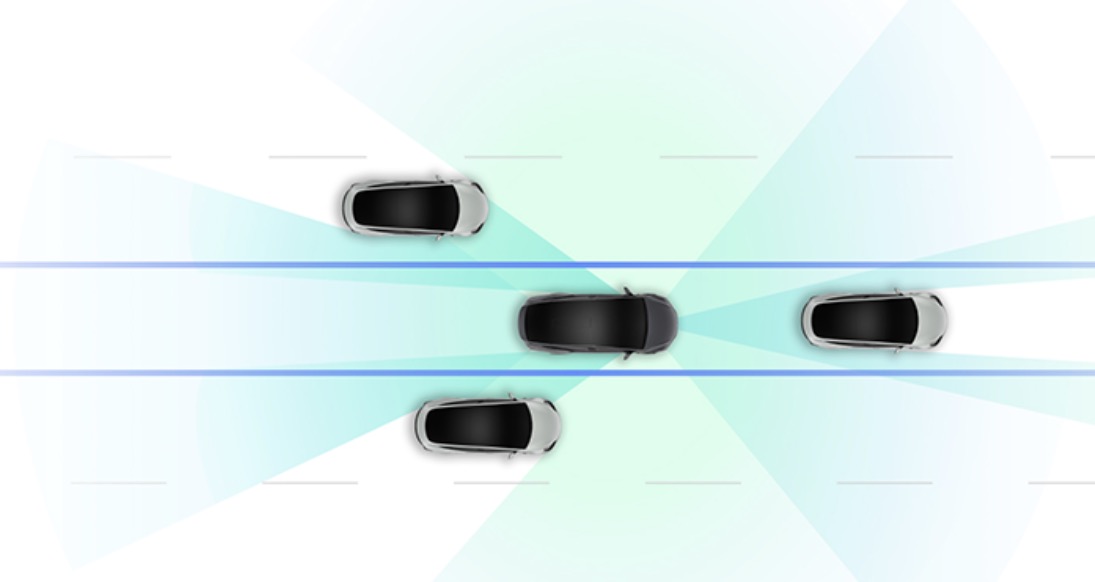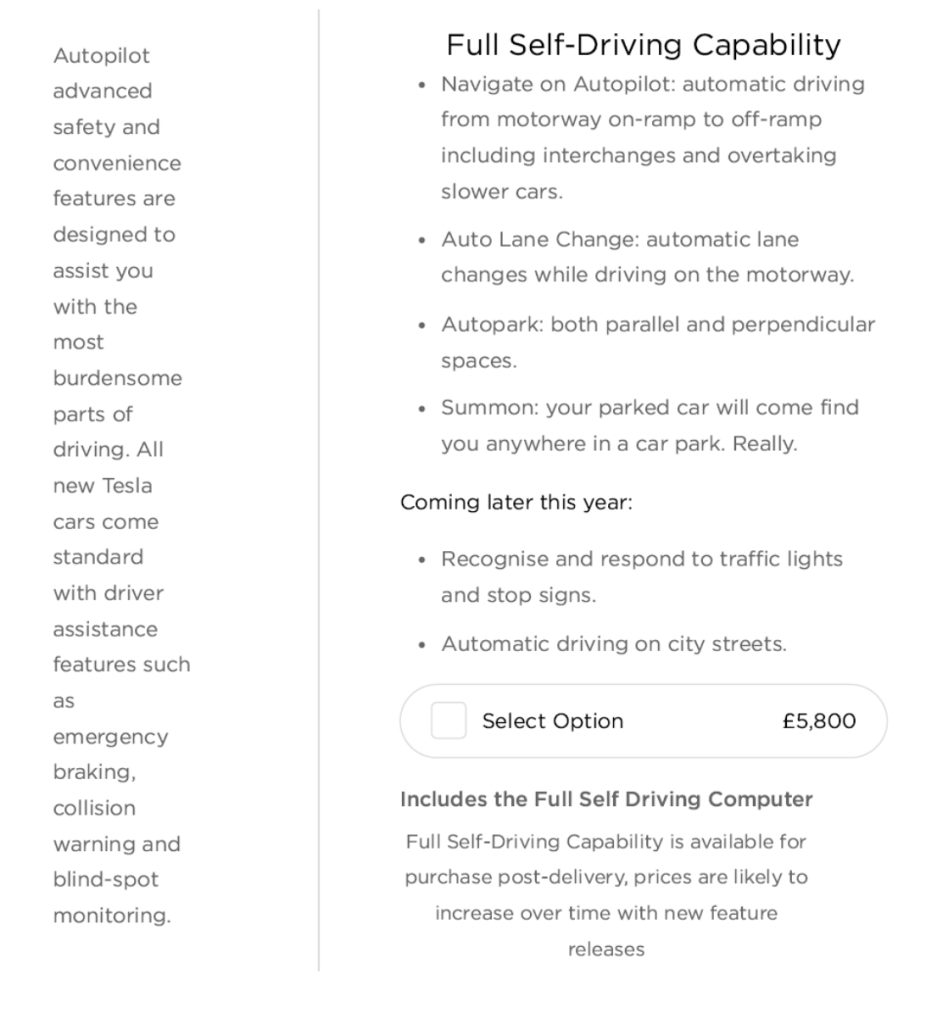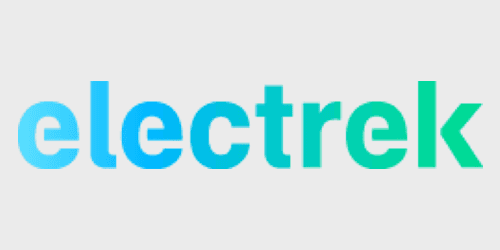
A Tesla owner in the UK challenged Tesla over its failure to deliver on its full self-driving claims and won a settlement representing a refund of his purchase cost of FSD, with interest, after filing a claim in small claims court.
Tesla’s Full Self-Driving system has been available since 2016, with Tesla stating at the time that all Teslas now have the hardware to fully drive themselves. The system went on sale that year as a $3,000 option, though prices have shifted up and down over time.
But the software… still doesn’t work. While Tesla finally released FSD beta to everyone in the US last year (after gating it behind a “safety score” for about a year), Teslas are still not actually capable of fully driving themselves.
Tesla’s system is still “level 2” on the SAE’s driving automation scale, which means responsibility lies with the driver. Drivers need to pay attention to the vehicle, and should, since FSD can make some pretty dangerous decisions.
The system has raised eyebrows with regulators, lawsuits, and political campaigns all claiming that Tesla advertises the system falsely by calling it full self-driving when it is not.
FSD Beta does deliver on some specific promises that Tesla made – namely, traffic light recognition and automatic driving on city streets. While the latter is not available unsupervised, it has been rolled out to customers – in North America, anyway. FSD Beta has only started being available in a few other territories outside North America earlier this year.
But the UK is not one of those places, and 2023 is not 2019. Which is the source of the claim we’ll be discussing today.
The claim was filed by Tesla owner Edward Butler, who detailed the process in a thread on Tesla Motors Club forum.
Butler purchased a Tesla Model 3 in 2019, along with the Full Self-Driving option at a price of £5800 (about $7,100 USD at today’s rates). He alleged that Tesla has not delivered on specific promises related to its Full Self-Driving option, and thus breached the Consumer Rights Act of 2015. His claim asked for a refund of the price of the system, with interest, and a rollback to eliminate FSD functionality for his vehicle.
Specifically, he cited Tesla’s website which in 2019 stated that traffic light recognition and automatic driving on city streets were “coming later this year.” Since Butler purchased the vehicle entirely from the website and without a test drive, the website description formed part of the purchase contract.

Since then, Tesla has delivered traffic light recognition in the UK, though that feature rolled out in September 2020, after Tesla’s self-imposed deadline. And Tesla has still not yet delivered automatic driving on city streets in the UK, nearly four years later.
Butler notified Tesla of his intent to file, and initially the company denied the claim. Then he filed with the UK courts’ Money Claim Online website, and his case was assigned to his local small claims court.
Once a court date was set, Tesla offered Butler a settlement offer – but initially, that settlement only included a refund of the initial price of the system, with no interest. And worse, for Butler, Tesla added clauses that would restrict him from talking about the settlement or providing anyone else instructions on how to pursue a similar claim.
Butler objected to these restrictions, and told Tesla that he would not accept any claims with these clauses included. After some further back and forth and telling Tesla that he would continue to pursue the court date, Tesla seemingly recognized that his claim was a “slam-dunk,” in Butler’s words, and agreed to the higher amount without the gag clauses included.
Butler says:
From Telsa’s POV, I am the worst type of litigator to take on. I am not a lawyer, but deal with them quite often in my day job so I know enough to put in a small claims action with confidence. The money wasn’t important to me, I felt they’d conned me and I wanted them to do the right thing and put it right. Moreover, because the money wasn’t important to me I was never going to sign up to a non-advice/confidentiality clause, I think it’s important that my experience is out there for others to form their own views from.
The settlement ended up being for £8,015.22, including interest and court fees, which is $9,860USD at today’s exchange rates. As a settlement, this does not set any legal precedents, but it does show that there is a strong case against Tesla, at least in the UK, over violation of UK law in its advertising claims.
Electrek’s Take
This isn’t the first time Tesla has been lost in court over false advertising relating to its self-driving system. Last year, it was ordered to upgrade one driver’s self-driving computer for free after announcing that it would charge owners $1,500 for hardware they already bought.
But small claims is not the most efficient way to hold companies accountable when they make false promises. While it is much cheaper and easier than a traditional lawsuit, because neither side is allowed to bring lawyers and the court filing system is streamlined in comparison, it’s still a roadblock and still requires fees.
It also requires knowledge of the system, which is why Tesla wanted to add a “non-advice” clause to Butler’s settlement. By tamping down on public knowledge of how to file these claims, Tesla can hopefully settle them one by one and not have to pay restitute across its entire customer base, at least 285,000 of which have paid for FSD.
This is why class actions are good at holding companies accountable, because they can combine several claims together. Otherwise, a company isn’t going to care about losing a few thousand dollars here and there – they’ll offer quick settlements and get on with their day.
Top comment by Sev
There is worst! In Europe we have paid for FSD and received nothing but promises. We don't have automatic driving on city streets, no traffic visualization, no traffic lights detection, no smart summon. It's basically an enhanced autopilot yet we paid for FSD.
It’s also why companies prefer binding arbitration clauses, which deprive workers and consumers of their legal right to seek remedy through the legal system or through class action lawsuits. But forced arbitration has been upheld repeatedly by the consumer-hostile “supreme” court of the US, more than half of whom were appointed or confirmed undemocratically, so it stands to reason that they wouldn’t care about what would benefit the public most.
This is relevant because Tesla recently weaseled out of one of these class action lawsuits by claiming successfully in court that all owners must go through arbitration if they want to receive remedy. The court even boneheadedly ruled that one owner who did not accept the arbitration clause was not allowed to sue because they waited too long to do so, even though Tesla’s violation is happening on a continuing basis.
And none of this is great for customer or public perception of Tesla. While they may be profiting off of sales of future software, they could do a lot better for goodwill by offering customers who feel jilted to refund a system which they’ve never been able to use – and may never be able to use over the course of the entire lifetime of the vehicle, given that some have now had FSD functionality for 6 years without it actually being usable yet.
For now, the steps above may not apply to the US the same as they apply to the UK. But if you’re in the UK and want your money back for a non-working Full Self-Driving system, it sounds like the process is relatively simple. Head on over to the Tesla Motors Club forum thread to learn more and see a selection of documents that Butler filed. And if anyone tries the same in the US (or if you have tried it and succeeded in the past), we’d love to hear about it.
FTC: We use income earning auto affiliate links. More.



Comments